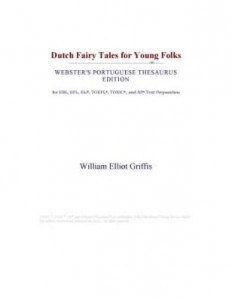WebsterÂ?s paperbacks take advantage of the fact that classics are frequently assigned readings in English courses. By using a running English-to-Portuguese thesaurus at the bottom of each page, this edition of Dutch Fairy Tales for Young Folks by William Elliot Griffis was edited for three audiences. The first includes Portuguese-speaking students enrolled in an English Language Program (ELP), an English as a Foreign Language (EFL) program, an English as a Second Language Program (ESL), or in a TOEFL® or TOEIC® preparation program. The second audience includes English-speaking students enrolled in bilingual education programs or Portuguese speakers enrolled in English-speaking schools. The third audience consists of students who are actively building their vocabularies in Portuguese in order to take foreign service, translation certification, Advanced Placement® (AP®) or similar examinations. By using the Webster's Portuguese Thesaurus Edition when assigned for an English course, the reader can enrich their vocabulary in anticipation of an examination in Portuguese or English. TOEFL®, TOEIC®, AP® and Advanced Placement® are trademarks of the Educational Testing Service which has neither reviewed nor endorsed this book. All rights reserved. WebsterÂ?s edition of this classic is organized to expose the reader to a maximum number of difficult and potentially ambiguous English words. Rare or idiosyncratic words and expressions are given lower priority compared to Â?difficult, yet commonly usedÂ? words. Rather than supply a single translation, many words are translated for a variety of meanings in Portuguese, allowing readers to better grasp the ambiguity of English, and avoid them using the notes as a pure translation crutch. Having the reader decipher a wordÂ?s meaning within context serves to improve vocabulary retention and understanding. Each page covers words not already
Dutch Fairy Tales for Young Folks (Webster's Portuguese Thesaurus Edition)
Sobre
Talvez você seja redirecionado para outro site












